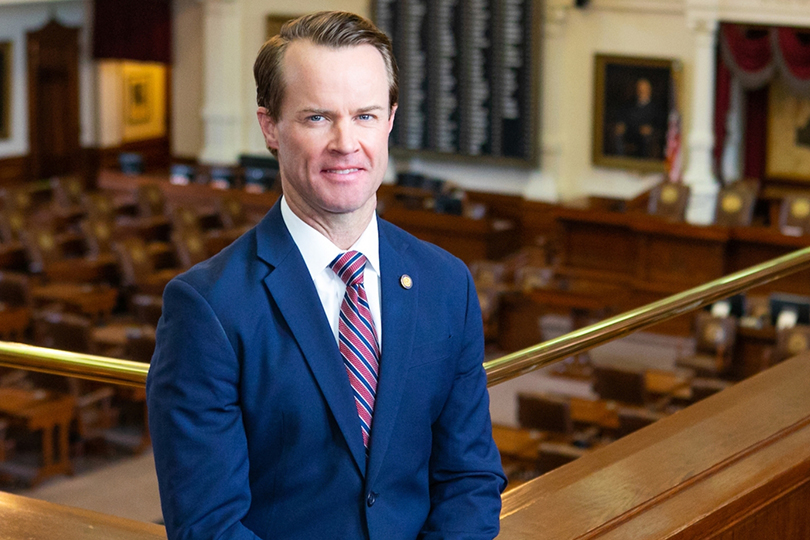Representative Dade Phelan (Beaumont) is the 76th Speaker of the Texas House and is currently serving his fourth term as State Representative for District 21.
Prior to serving as Speaker, he served as Chair of the House Committee on State Affairs, as Vice-Chair of the Natural Resources Committee, as a member of the Calendars, Appropriations, and Elections Committees, as well as the Select Committee on Ports, Innovation and Infrastructure.
In 2019, Speaker Phelan was named by Texas Monthly as one of the Best Legislators of the 86th legislative session. He has earned numerous additional accolades in recognition of his legislative service, including Capitol Inside’s Most Valuable Sophomore Member in 2017 and as one of their Most Outstanding Freshmen Legislators in 2015. Phelan has been named Legislative Champion by the Boys and Girls Club of Texas, Legislator of the Year by the Texas Apartment Association, Guardian of Small Business by the National Federation of Independent Business, Most Valuable Legislator by the Texas Association of Community Schools, a Fighter for Free Enterprise by the Texas Association of Business and the 2019 Mental Health Champion by Mental Health America.
Phelan is the former president and two-time Governor appointee to the Lower Neches Valley Authority. His board service includes the Texas Lyceum, Southeast Texas CASA, Golden Triangle Coastal Conservation Association, The Jefferson Theater, St. Anne Catholic Church and Catholic Charities of Southeast Texas.
In addition to the duties he has as Speaker, Phelan works as a real estate developer at his family’s fourth- generation commercial real estate development firm, which owns and manages retail, industrial and office property in Texas and Arkansas.
His wife, Kim, is a solo practitioner attorney and together they have four sons, Ford, Mack, Hank and Luke. He and his family reside together in Southeast Texas, where Speaker Phelan was born and raised. He received his bachelor’s degree in Government and Business from The University of Texas at Austin.
Below is a special question and answer session Speaker Phelan participated in with Texas Farm Bureau.
How would you describe your leadership style?
I believe that my colleagues in the Texas House know that I am fair and will provide a level playing field for them to advocate on the issues about which they feel passionate. Each state representative has a unique district, and I recognize that the House does not operate well with a one-size-fits-all approach. The needs of rural Texas are vastly different from those of our urban centers, and I recognize that our differences make us stronger. Our team attempts daily to provide an inclusive environment and weighs all perspectives, and I hope that those are the hallmarks of my tenure as Speaker.
How would you define a successful session this year?
Our state faces difficult challenges as we emerge from the aftershocks of the pandemic, and we must meet them head-on to protect our state’s footing as an economic beacon and agricultural hub for our nation. We must pass a balanced budget that does not harm taxpayers, we must protect and defend liberties, and we must reform our grid after the devastation we saw resulting from Winter Storm Uri and the ensuing bureaucratic disaster.
What influences helped shape your interest in public service?
I had an internship in the Texas House when I attended The University of Texas that ignited in me a passion for public service and public policy as a way to improve the lives of our families and allow businesses to thrive. In Texas, we have many rich natural resources, and we need to pass sensible policies so we don’t make the same mistakes we’ve seen in other states that have lost their way due to overtaxing and impeding liberty.
How can issues important to rural Texas remain competitive with urban/suburban issues in such a growing state?
For starters, we need to get rural Texas connected. Those who struggle with internet accessibility face setbacks, no matter the issue. Whether it’s educating our kids, building our businesses, connecting to healthcare providers, or advocating for our industries—so much of what it takes these days to provide for our families and compete for resources hinges on reliable internet access.
To compete with urban and suburban issues, rural Texans need to stay vigilant and engage in all levels of the policymaking process. Involvement with groups like Texas Farm Bureau benefits its members, because the bureau maintains an active presence in both the legislative and regulatory arenas and helps provide lawmakers a unified and clear message. That goes a long way, especially during these tumultuous times.
How has growing up and living in Southeast Texas impacted your understanding and awareness of agriculture?
I’ve witnessed the dwindling rice farms and land fragmentation in Southeast Texas. The rice farms suffered due to having to compete for resources in the fight for downstream water rights with upstream users. Competing for resources is a common struggle in agriculture and is an issue that becomes more and more complex as our population grows. We need to be thoughtful as we plan our communities and preserve our natural resources in a way that protects our state’s farming and ranching heritage.

